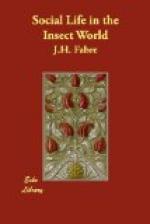It is also the only obstacle which the adult will encounter at the moment of exit. To lessen the difficulty of opening it the grub takes the precaution of gnawing at the inner side of the skin, all round the circumference, so as to make a line of least resistance. The perfect insect will only have to heave with its shoulder and strike a few blows with its head in order to raise the circular door and knock it off like the lid of a box. The passage of exit shows through the diaphanous skin of the pea as a large circular spot, which is darkened by the obscurity of the interior. What passes behind it is invisible, hidden as it is behind a sort of ground glass window.
A pretty invention, this little closed porthole, this barricade against the invader, this trap-door raised by a push when the time has come for the hermit to enter the world. Shall we credit it to the Bruchus? Did the ingenious insect conceive the undertaking? Did it think out a plan and work out a scheme of its own devising? This would be no small triumph for the brain of a weevil. Before coming to a conclusion let us try an experiment.
I deprive certain occupied peas of their skin, and I dry them with abnormal rapidity, placing them in glass test-tubes. The grubs prosper as well as in the intact peas. At the proper time the preparations for emergence are made.
If the grub acts on its own inspiration, if it ceases to prolong its boring directly it recognises that the outer coating, auscultated from time to time, is sufficiently thin, what will it do under the conditions of the present test? Feeling itself at the requisite distance from the surface it will stop boring; it will respect the outer layer of the bare pea, and will thus obtain the indispensable protecting screen.
Nothing of the kind occurs. In every case the passage is completely excavated; the entrance gapes wide open, as large and as carefully executed as though the skin of the pea were in its place. Reasons of security have failed to modify the usual method of work. This open lodging has no defence against the enemy; but the grub exhibits no anxiety on this score.
Neither is it thinking of the outer enemy when it bores down to the skin when the pea is intact, and then stops short. It suddenly stops because the innutritious skin is not to its taste. We ourselves remove the parchment-like skins from a mess of pease-pudding, as from a culinary point of view they are so much waste matter. The larva of the Bruchus, like ourselves, dislikes the skin of the pea. It stops short at the horny covering, simply because it is checked by an uneatable substance. From this aversion a little miracle arises; but the insect has no sense of logic; it is passively obedient to the superior logic of facts. It obeys its instinct, as unconscious of its act as is a crystal when it assembles, in exquisite order, its battalions of atoms.
Sooner or later during the month of August we see a shadowy circle form on each inhabited pea; but only one on each seed. These circles of shadow mark the doors of exit. Most of them open in September. The lid, as though cut out with a punch, detaches itself cleanly and falls to the ground, leaving the orifice free. The Bruchus emerges, freshly clad, in its final form.




